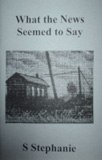January 30, 2011WHAT THE NEWS SEEMED TO SAY
Review by Mark DeCarteret
Pudding House Publications
3252 Parklane Ave.
Columbus Ohio 43231
ISBN-10 1-58998-774-8
2009, 28 pp., $10.00
www.puddinghouse.com
Almost all of your best political poetry—works of testimony, indignation and grief, even fiery wrath over the state of our planet–eventually finds itself turning inwards, settling in on the self and the very idea of paying witness. It’s an inquiry into not only one’s moral stance but one’s motives for taking pen to paper and enlisting one’s creative powers in the first place, rather than this exercise in legitimization or mere “concept” that Eliot Weinberger believes it is sometimes reduced to, a flat-lined act of “literalism and hair-splitting historicism” that he claims is only remarkable for its “absolute denial of imagination.” In S Stephanie’s latest chapbook, What the News Seemed to Say, this tension doesn’t so much inform or make good on its presence as it impairs and disorders, interrupts like these transmissions sent to us under a poetic-fire, though often panic-stricken, overcome, always sentient of a position not so much in harm’s way or dangerous as it is complicated and at odds with those gods who would have us speak up and be fully present.
How fitting that the opening poem “While Reading about a ‘Ghost House’ in Sudan” steals in with the interrogatory “And that begs the larger question doesn’t it?” and its immediate follow-up shadow, “I mean, can I?” It’s a highly vexed, compromised dispatch from the most common of frontlines for the average American: the TV/living room, where we finger-click between award show and atrocities as the speaker does here, trying to splice in the mundane and inane with the footage of casualties far off in the distance, this phantom-stock, and “the shade/they cast in the doorway of a too empty house/there…” along with their stifling soundtrack, this “echo of human crimes as clearly/as steps on gravel, the shine on boots of soldiers,/the dark side of hearts doing their business/to humanity.”
These ever-breaking-up communiqués with their lines of pooled pain and unsettling loops, these starkest and most soul-arresting of acknowledgments (“Some days I don’t know how far/I can travel… Some days I’m just stuck in my neighborhood…”) eventually leave the poet to his or her own half acre or so and the unplotted white of the page:
But I see instead, I have dropped my notebook
on the wet lawn and spent most of my morning
trying to rhyme the word clay with the word glass.
And yet these poems do a lot more than protest or top off our collective conscience with a shot of whatever’s clearest. They factor-in and they chafe. They face off against all manner of demons, unnamed and named, public and personal. Never more powerfully than in the poem “When the doctor called with the diagnosis,” a prescription-sized lyric, this devastating signing-away, where the speaker, learning of their partner’s sickness, succumbs to an indispensable silence:
When we reached out to one another
in comfort, our awkward hands
slid and fell to our sides
like pages slipping from their journal.
But most of all, they perform a sort of spiritual fact-checking, where gods in their many forms often figure as rulers of another kind, these cosmic indicator species that often take the shape of the overlooked, ordinary—one’s pets or the spare keys we keep at the bottom of pots like “little miseries” (“Something Different about the Neighborhood”). More importantly, they counter-act not only the quick-cure of these neighborhood interventions but poetry’s past stars as well, half-consoling, half-riffing off one half of America’s most famous double bill in the poem “Chilly September” almost with a child’s puffed innocence:
Poor Whitman, Father of Grief,
the language of my century
I fear even he could not sing.
And though I hear the bells ring
for the Captain, my Captain has a mouth
full of rock, paper, scissors.
Yet for all their raised fists and resistance, their attempts to make peace and transform us, these deeply-felt, well-reasoned poems ultimately win us over through their craft and their prayer-like attention to our uncertainty, and their willingness to “[c]ut us a straight path to the small, active/verbs—those words that admit/our passions, our grief and mistakes” (“Justice”).